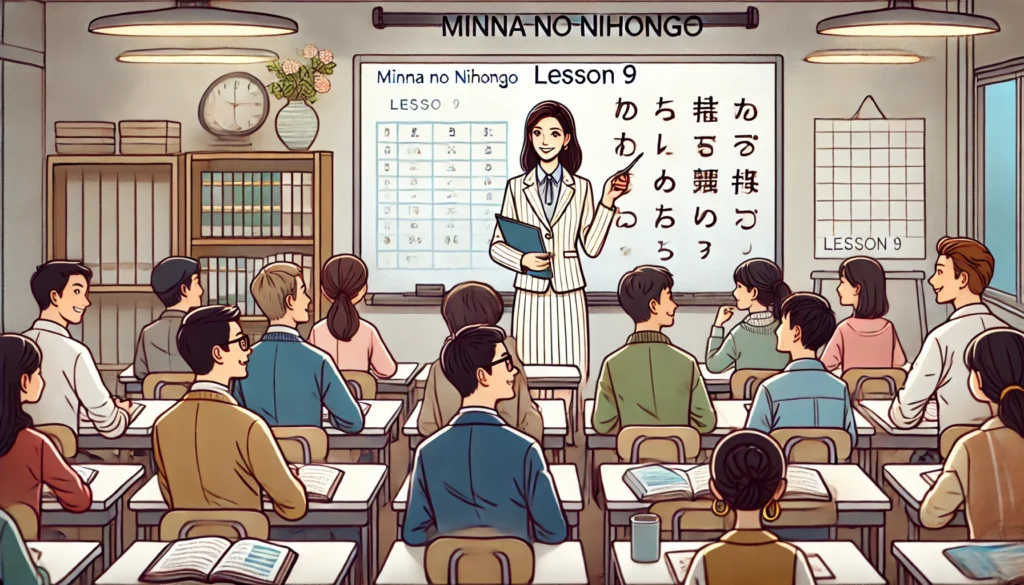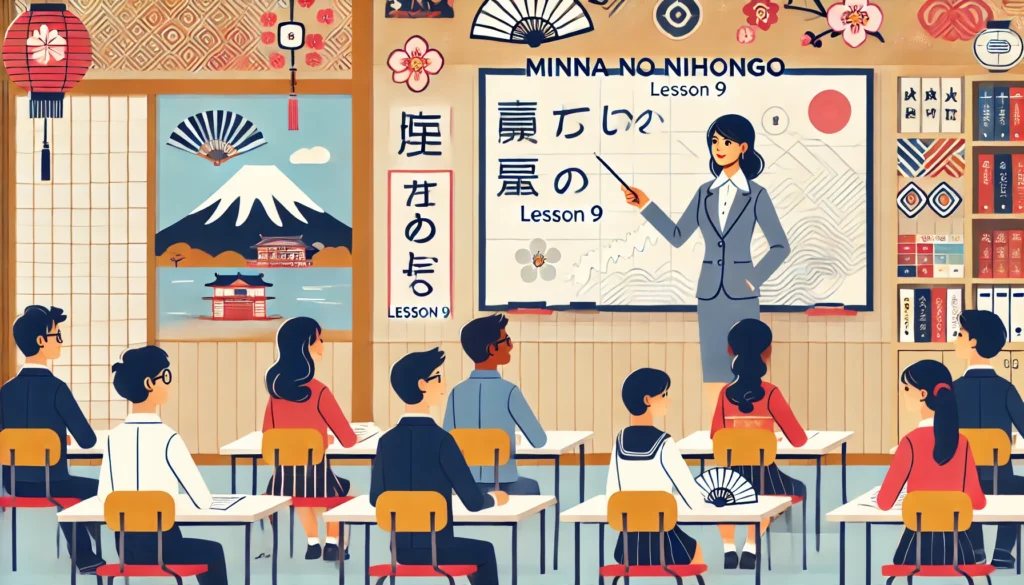Minna no Nihongo Lesson 9 Vocabulary: “Minna no Nihongo” is a cornerstone for learning Japanese, and Lesson 9 is a particularly exciting chapter. It dives into the vocabulary and grammar needed to express likes, dislikes, abilities, and hobbies—essential tools for everyday communication.
This article focuses primarily on the vocabulary of Lesson 9, along with key grammar points and an overview of the answer key to support your studies.
Minna no Nihongo Lesson 9 Vocabulary
The vocabulary in Lesson 9 introduces words and phrases that enable learners to talk about preferences, hobbies, and skills. Below, we’ll explore these terms in detail and categorize them for easier understanding. Let’s dive into over 1,000 words of vocabulary knowledge!
Read More: 5 Best kanji Learning Methods
1. Hobbies and Interests
Understanding hobbies and interests is crucial for conversations about personal activities. Lesson 9 introduces some essential terms:
- スポーツ (supôtsu): Sports
- ヤキュウ (yakyū): Baseball
- リョウリエ (ryōri): Cooking, cuisine
- うた (uta): Song
- エンジニア (enjinia): Engineer (hobby-related context in the lesson)
- ラジオ (rajio): Radio (listening as a hobby)
- 映画 (eiga): Movie
- 曲 (kyoku): Song track
2. Preferences and Likes
These words help express likes, dislikes, and preferences:
- すき (suki): Like, fond of
- きらい (kirai): Dislike
- だいすき (daisuki): Love, very fond of
- だいきらい (daikirai): Hate, strongly dislike
- すきな (sukina): Favorite (adjective form)
- プログラム (puroguramu): Program (e.g., favorite TV program)
3. Skills and Abilities
Lesson 9 also focuses on terms that describe one’s skill level:
- じょうず (jōzū): Skillful, good at
- へた (heta): Unskillful, poor at
- とくい (tokui): Strong at (used for oneself)
- にがて (nigate): Weak at, dislike doing
4. Everyday Items and Activities
A conversation about preferences often involves everyday items or activities:
- たべもの (tabemono): Food
- もの (mono): Thing
- ドラマ (dorama): Drama
- おかね (okane): Money
- 食べる (taberu): To eat
- 飲む (nomu): To drink

5. Frequency and Degree
To discuss how often or how much someone likes something, these words come into play:
- よく (yoku): Often
- たいてい (taitei): Usually
- あまり (amari): Not very (used with negatives)
- ぜんぜん (zenzen): Not at all (used with negatives)
You Can Read: Minna no Nihongo Lesson 10
Minna no Nihongo Lesson 9 Grammar
Lesson 9’s grammar complements the vocabulary, allowing learners to form meaningful sentences. Here are the key points:
1. Expressing Likes and Dislikes
- Structure: [Noun] が [suki/kirai] です
- Example: わたしは ヤキュウが すき です。 (Watashi wa yakyū ga suki desu.) “I like baseball.”
2. Talking About Skills
- Structure: [Noun] が [jōzū/heta] です
- Example: かれは りょうりが じょうず です。 (Kare wa ryōri ga jōzū desu.) “He is good at cooking.”
3. Frequency and Degree Modifiers
- Example: かのじょは えいがを よく 見ます。 (Kanojo wa eiga o yoku mimasu.) “She often watches movies.”
4. Negative Constructions
- Structure: [Noun] が [suki/kirai/jōzū/heta] じゃない です
- Example: たべものが きらい じゃない です。 (Tabemono ga kirai janai desu.) “I don’t dislike food.”
Minna no Nihongo Lesson 9 Answer Key
To help solidify your understanding, here are some typical exercises and answers from Lesson 9:
Exercise 1: Fill in the Blanks
- Example: 「わたしは スポーツが ______ です」
- Answer: 「わたしは スポーツが すき です」 (Watashi wa supôtsu ga suki desu.)
Exercise 2: Translation
- Translate: “I dislike cooking.”
- Answer: 「わたしは りょうりが きらい です」 (Watashi wa ryōri ga kirai desu.)
Exercise 3: Correct the Sentence
- Example: 「たべものが じょうず です」
- Correction: 「たべものが じょうず じゃない です」 (Tabemono ga jōzū janai desu.)

Tips for Learning Vocabulary
- Practice Daily: Repetition is key. Use flashcards or apps like Quizlet to memorize words.
- Create example sentences: Incorporate new words into sentences to reinforce their meanings.
- Engage in Conversations: Practice talking about your hobbies and preferences with a partner.
- Listen to Japanese Media: Watch shows, listen to songs, or follow podcasts that use similar vocabulary.
Conclusion
Lesson 9 of “Minna no Nihongo” equips learners with a versatile vocabulary set and practical grammar tools to talk about their likes, dislikes, and abilities. By focusing on these words and practicing regularly, you’ll gain the confidence to express yourself in Japanese effectively. Pair your studies with the answer key to ensure accuracy and enjoy the journey of mastering Japanese!